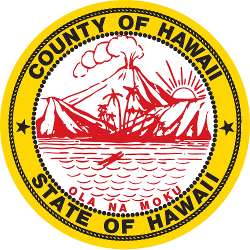In partnership with Community First Hawaiʻi and the University of Hawaiʻi at Hilo, the County of Hawaiʻi has launched the Kuleana Health Project to lead a consortium of local health organizations focused on improving health outcomes through increasing health literacy. This 2-year project was made possible through a $3,000,000 grant from the U.S. Department of Health and Human Services (HHS) Office of Minority Health (OMH) to the County of Hawaiʻi. In addition, Hawaiʻi County was selected competitively to be part of a $250 million, two- year initiative to identify and implement best practices for improving health literacy to enhance COVID-19 vaccination and other COVID-19 mitigation practices among underserved populations. The Advancing Health Literacy (AHL) to Enhance Equitable Community Responses to COVID-19 initiative is part of the Biden/Harris Administration’s National Strategy for COVID-19 Response and Pandemic Preparedness.
“Securing these funds is critical to ensuring the health and prosperity of our community through the pandemic and beyond,” said Mayor Mitch Roth. “Our administration is focused on a thriving Hawaiʻi Island, and adequate healthcare plays a large role in that. By working diligently with all branches of government and the private sector to tackle the growing health disparities faced by many islandwide, we can and will create a sustainable county where our keiki and raise their keiki for generations to come.”
Health literacy is a person’s ability to find, understand and use information and services to help them make health-related decisions for themselves and others. Health literacy is a central focus of the Healthy People 2030 blueprint for improving the health of the nation, which is sponsored by the HHS Office of the Assistant Secretary for Health. Healthy People 2030 has elevated health literacy within one of its overarching goals: Eliminate health disparities, achieve health equity, and attain health literacy to improve the health and well- being of all.
Under the County’s administrative leadership, Community First Hawaiʻi has initiated project activities while collaborating with the University of Hawaiʻi at Hilo on program evaluation and quality improvement. Over the next two years, the Kuleana Health Project will work with local consortium partners to develop a health literacy plan to increase the availability, acceptability, and use of COVID-19 public health information and services by racial and ethnic minority populations.
The consortium partners include:
- Bay Clinic, Inc.
- Kīpuka O Ke Ola Waimea
- Hui Mālama Ola Nā ʻŌiwi
- Kaʻu Rural Health Community Association
- Hamakua-Kohala Health
- West Hawaiʻi Community Health Center
- District Office Hawaiʻi Department of Health
The projects will also focus on underserved and rural communities by addressing chronic disease disparities through improved utilization of telehealth by community members. The Kuleana Health Project is also expected to leverage local data to identify racial and ethnic minority populations at the highest risk for health disparities and low health literacy and populations not currently reached through existing public health campaigns.
“A thriving community is made up of individuals and families that are empowered to take responsibility for their health,” said Randy Kurohara, executive director of Community First Hawaiʻi. “The effort to increase health literacy is, at its core, about removing barriers between patients and providers so that every one of us can make informed health care choices for ourselves.”
“Through this islandwide consortium, we aim to address health disparities among Pacific Islanders, Filipinos, Native Hawaiians, and Hispanics as well as individuals living in rural communities,” said the County of Hawai’i Department of Research and Development Director Doug Adams. “The Kuleana Health Project is currently in the process of formalizing consortium partnerships with local community health organizations. We are very pleased to have established this co-leadership with Community First Hawaiʻi and the University of Hawai’i at Hilo, and are very excited to announce the consortium partners in the coming weeks.”


